Back to the Mac: OS X 10.7 Lion Review
by Andrew Cunningham, Kristian Vättö & Anand Lal Shimpi on July 20, 2011 8:30 AM ESTFileVault Performance
With Lion sporting a more usable version of FileVault I was curious about its performance impact. I'd enabled FileVault on my personal machine and subjectively felt a performance impact, but I needed to quantify it. I put together a number of tests to do just that.
For all of these tests my test platform is a 15-inch MacBook Pro with a 2.2GHz Sandy Bridge Core i7 from early 2011 with an Apple branded 256GB SSD. In these tests I was primarily concerned with two things: how performance is affected, and what sort of extra load FileVault encryption places on the CPU.
Our first test is a simple file copy. I've got a directory of 2200MB worth of RAW files from a Nikon D700. I copy the folder from the SSD to the same SSD and report performance in MB/s:
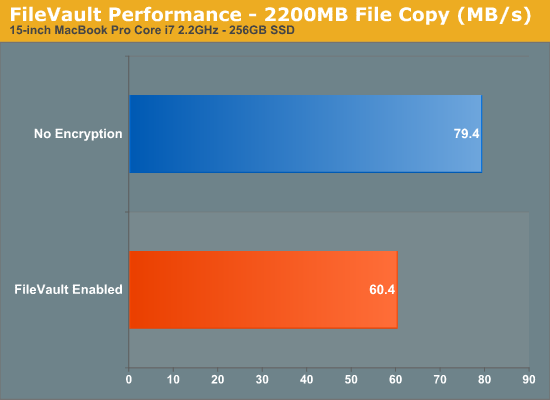
With FileVault enabled we take a 24% performance hit, hardly insignificant. Average CPU utilization during the file transfer actually dropped with FileVault enabled from 8.5% to 4.5%. I suspect the reason for the drop was the slower overall transfer rate. It would appear that FileVault, at least on a quad-core Sandy Bridge CPU has absolutely no overhead here. Given that Apple near-universally uses AES for symmetrical encryption, it's reasonable to assume here that FileVault is taking advantage of the AES-NI instructions on Intel's Core-i series of processors.
Our next test tested one of Lion's new features: threaded conversations in Mail. We timed how long it took to launch Mail and open a single email thread with 42 replies. If you've used OS X Mail in the past you'll know that CPU utilization goes insane if you're working on a thread with dozens of replies. The same is definitely true for threaded conversations in Lion.
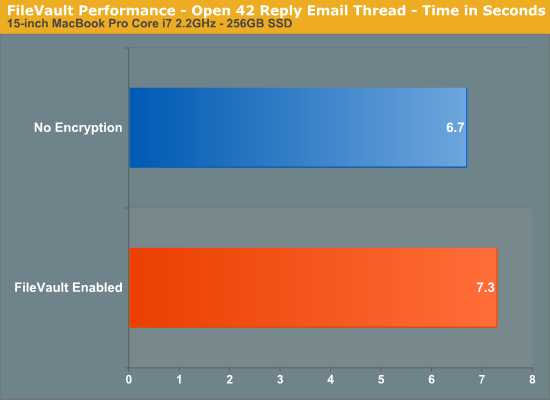
Thanks to the MacBook Pro's SSD both setups complete this task pretty quickly. There is a penalty associated with FileVault though - around 9% in this case. Peak CPU utilization was similar on both systems, 100% of four threads on the eight thread Core i7.
I grabbed a screenshot of the CPU utilization graph in Activity Monitor during this test for both setups:
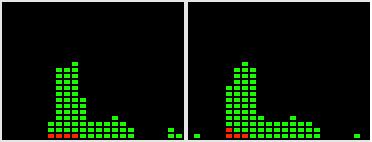
CPU Utilization: No Encryption (left) vs. FileVault Enabled (right)
While the two vary slightly, you can see that overall CPU utilization appears to be similar regardless of whether or not encryption is enabled.
Our third test is actually one of our standard OS X CPU benchmarks - we time the import of 203 RAW images into iPhoto. This task is impacted by both CPU and I/O performance:
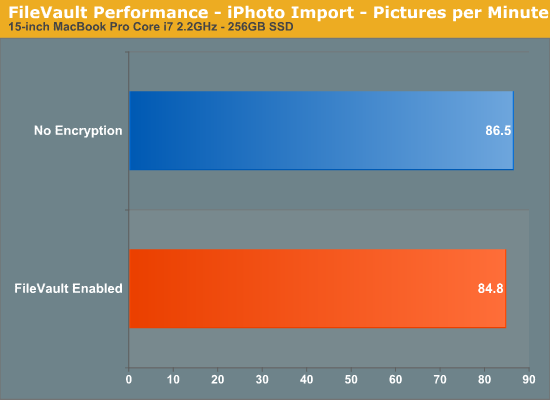
Despite the I/O dependency, there's virtually no performance impact to enabling FileVault here.
Our final tests are raw I/O tests using Quickbench. I focused on 4KB and 8KB random read/write since those are the most common transfer sizes for random file access. And for sequential operations I focused on 128KB transfers, again optimizing for common sizes.
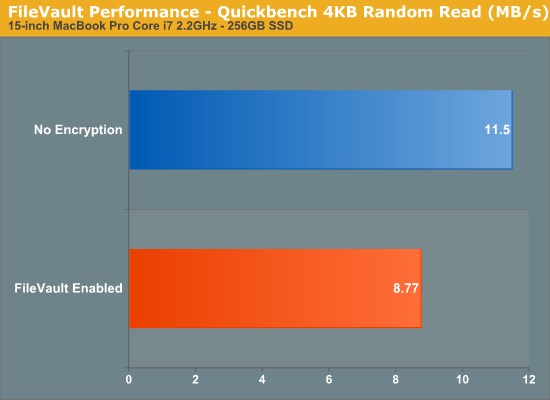
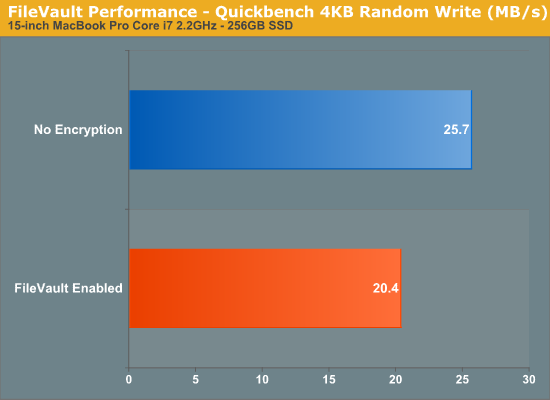
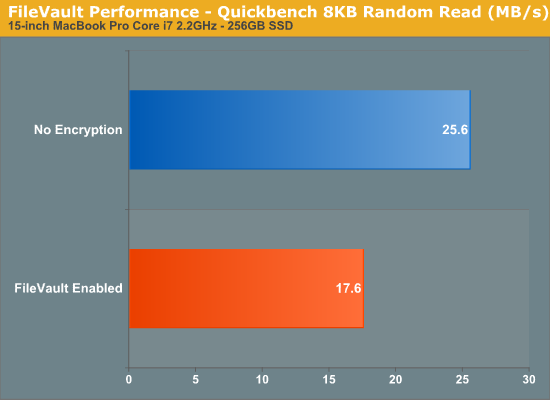
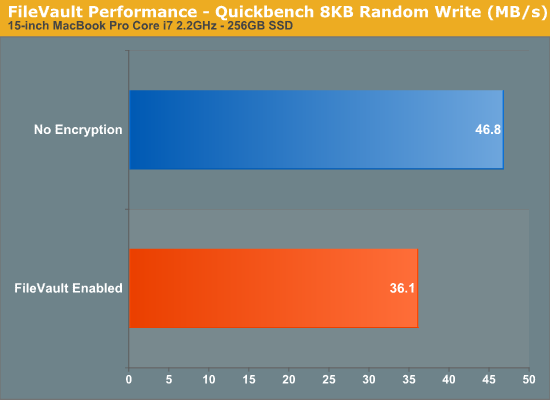
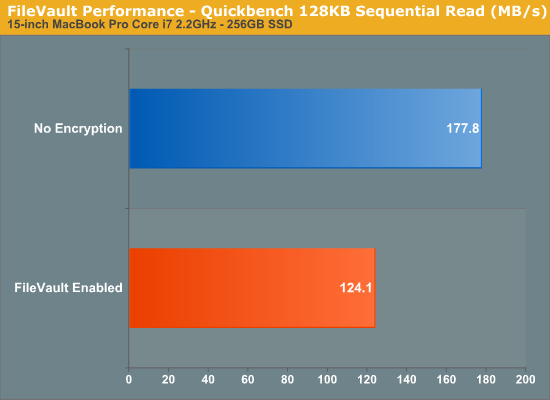
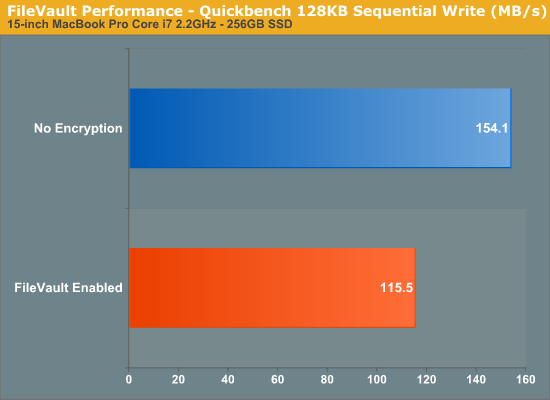
Overall the hit on pure I/O performance is in the 20 - 30% range. It's noticeable but not big enough to outweigh the benefits of full disk encryption. Note that under OS X there's still no way to take advantage of SSD controllers with FDE like the SF-1000/2000 series and the Intel SSD 320.










106 Comments
View All Comments
parlour - Monday, July 25, 2011 - link
The revenue includes all the money that is payed to developers, music labels and media companies. Apple keeps no more than 30% (probably quite a bit less) of it.bwmccann - Wednesday, July 20, 2011 - link
Just started playing it a month ago and my entire family is hooked!ltcommanderdata - Wednesday, July 20, 2011 - link
I don't suppose you could compare OpenCL performance between Snow Leopard, Lion, and Windows 7? Given the increasing emphasis Apple is putting in OpenCL and the requirement for it in Final Cut Pro X and no doubt future iLife and pro apps, it'll be good to see how their latest implementation stacks up in performance rather than just feature-set (Lion bumps things to OpenCL 1.1 from 1.0 in Snow Leopard.)jensend - Wednesday, July 20, 2011 - link
The claim that GPL3 "prohibits inclusion in retail products" is an outright lie. It's not just an inaccuracy- there's no way anybody who was even slightly informed about these things would think that; the ability to sell the software is one of the basic freedoms the GPL has always been about protecting.It is true that Apple refuses to use GPL3 software. The only reason I can think of for this is that the GPL3 says that if you distribute software under the GPL3 you implicitly grant patent licenses to everybody for any patents you may have which cover the software. Apple's wish to use its portfolio of obvious and non-innovative patents as a weapon to destroy its competitors conflicts with this.
Confusador - Thursday, July 21, 2011 - link
Came here to say this and you've got it covered. This is an unusual case of blatantly false information on AT, you guys are usually much better informed than this.batmang - Wednesday, July 20, 2011 - link
I'm a little surprised that Anand didn't include any gaming benchmarks in this OS review just for simple comparison. Overall though, fantastic review and I'll certainly be upgrading to Lion in a week or so. I'm waiting to see if any oddball bugs arise before taking the plunge. Thanks for the review Anand.Kristian Vättö - Wednesday, July 20, 2011 - link
I think he was going to but didn't have time (we wanted to get this out right when Lion went live). I don't know about his plans but maybe he will update this with GPU performance or do a separate article about that.Gigantopithecus - Wednesday, July 20, 2011 - link
"Business customers can get Lion for $29.99 per copy in units of 20 or more, and educational institutions can buy it along with the latest iLife and iWork upgrades for $39 in quantities of 25 or higher. Especially when compared to Microsoft's complicated and expensive Windows licensing, these simple, low and clearly defined upgrade prices are extremely welcome."I can't speak for business customers, but pricing for higher ed institutions is extremely variable for MS software.
To wit, at the University of Wisconsin, our tech store offers zero discounts compared to retail on all Apple software, whereas both W7 Pro & Enterprise are $10 for one license and $25 for a fiver. At the University of Michigan, Apple OS software is similarly sold at retail with no discount, while W7 Pro is $19. Michigan State offers no discounts on both OS X and W7 vs retail. Indiana University sells OS X for retail & W7 for $20.
I'm not familiar with direct-from-Apple educational pricing, but if you go to actual universities' actual computer stores, MS software is sold at enormous discounts at 3 of the 4 Big Ten campuses I'm familiar with. Saying Apple offers lower OS pricing than MS to higher ed customers is flat out inaccurate.
mrd0 - Wednesday, July 20, 2011 - link
Same at Washburn University's School of Law...I purchased the full enterprise Office 7 and then 10 for $9.95, and Windows 7 for $29.95. Apple software is not discounted.SmCaudata - Wednesday, July 20, 2011 - link
Minnesota is Free to download or the cost of printed media ($8). This was when I was there at least.At Colorado both Windows and Office are also free to download. Before that (last year) they participated in the $29 usage option for office.
The fact is Windows/Office is really only expensive if you are building your own computers and installing your own OS. Even then you can get it rather cheap and the money you save more than makes up for the extra $50 Windows 7 runs over this. Also this only updates on SnowLeopard. If you didn't have that upgrade it will cost you more. Win7 upgrades back to XP, correct?